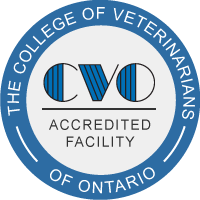|
|
|
As an Essential Service Provider we are open and our services are running. We take all the measures to protect our clients and ourselves from Covid-19 and to keep our environment safe. Please call us for detailed information!
|
Unionville South Pet Hospital
(905)604-5604
www.unionvillevet.com
|
Vaccinations for Your Pet
Routine vaccinations are one of the best ways to keep your pet healthy and protected. At Unionville South Pet Hospital, we advise vaccinations tailored to your pet's individualized risk factors, life stage, and lifestyle to determine which vaccines they need and how often. Following the routine puppy and kitten series of vaccinations and one-year booster shots, we recommend vaccinating dogs for distemper, hepatitis, parainfluenza and parvovirus. Cats should be vaccinated for panleukopenia and upper respiratory viruses.
Based on previous vaccine history and life stage, vaccination boosters are administered based on current American Animal Hospital Association (AAHA) and America Association of feline Practitioners (AAFP) recommendations. Many viral vaccines provide immunity for longer than 3 years, while bacterial vaccines such as bordetella (kennel cough) and leptospirosis do not stimulate long-term immunity and need to be boostered every year.
Vaccinations begin between ages six and eight weeks of age for puppies and kittens. We booster until about 16 weeks-old because this is the time when puppies and kittens begin to lose the immunities provided by mother's milk and have a fully developed immune system. Puppy and kitten boosters are administered to lessen the severity of certain life-threatening diseases. After four months of age, most pets are protected for one year.
Your pet's vaccinations are tailored to fit their lifestyle. If they visit grooming salons, boarding facilities, obedience classes, dog parks, outdoor cats, go hiking and other places, they may be in more frequent contact and exposure with diseases. They may need yearly protection against distemper, parvo, bronchitis, leukemia, parainfluenza, and rabies.
Additional resources
|





